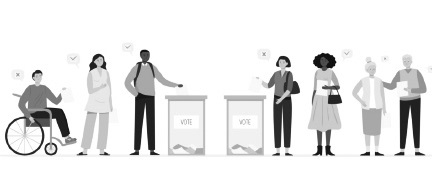
Persons With Disabilities (PWDs) still have difficulties when it comes to politics be it to vote or be elected. Given the less attention that is paid to them, it is impossible to deny the fact that they are not active participants of politics. Lists can go on and showcase the barriers and how they are underrepresented in the political sphere.
Several literatures have identified isolation, lack of awareness, accessibility and limitation in resources as main barriers to the political participation of PWDs. When there are countries like UK where state funds have been made available to compensate PWDs for disability-related costs during political campaigns, having to still talk about the political participation of PWDs in the general election is impractical.
The United Nations Convention on the Rights of Person with Disabilities (UNCRPD) underscores the equal right of people with disabilities to participate in political life. Yet, in many countries people with disabilities do not exercise their rights equally.
According to Article 29 of the United Nations Convention on the Rights of Person with Disabilities, PWDs have the right to take part in politics. This article says that all people with disabilities have the same right to take part in politics as other citizens.
Moreover, the Convention requests governments to make sure that people with disabilities have the same chances to take part in politics as anyone else [able bodied]. Thus, in order to let PWDS get all the support they need to enjoy their political rights, the government should make sure that people with disability have access to elections.
Zenebech Getaneh, Former President of Ethiopian Women with Disabilities Association noted that PWDs have the right to be included in social, political and economic areas in the nation. Just like the rest of the society, they should be encouraged to be engaged in the decision making positions.
This is one of the main reasons why PWDs should take part in politics as it is easier to let their voices be heard through participating in the process. They should have a say in how their country should be run. However, this is only possible if situations allow them, she stressed.
Appreciating the move that is being taken by the government in incentivizing the political parties who enlist people with disabilities for candidacy by allowing more campaigning airtime for parties, she further stated that in order for them to exercise their rights accordingly, accommodations such as accessible voting machines for the visually impaired, sign language interpreters for the hearing impaired and other facilities should be fulfilled at their local polling places.
One of the promising endeavors that could be taken as eye opener for future elections is regarding the measures taken to involve visually impaired citizens in which they are allowed to bring their trusted helpers to the polling station so that they can help them with the voting.
Even though much more needs to be done to be more inclusive and address the challenges that each persons with disabilities face in political life, the efforts that are putting in to practice by concerned institutions is encouraging.
To this end, promoting support for parties which hold candidate with disabilities and encouraging others to recruit and mentor PWDs with leadership potentials is essential in bringing them to the frontline in politics as well as other public spheres, as to the former President.
On the other hand, the government need to give due emphasis in encouraging opposing political parties to reconsider quotas in parties, as to her.
In an interview with local media Soliyana Shimeles, Communication Advisor to the National Electoral Board, illustrated that the six general elections is different from previous elections in terms of efforts that are being exerted to incorporate and help marginalized groups participate in the upcoming election.
She further explained that Internally Displaced People and people with disabilities will be given special focus to enhance their participation in the soon to be hold general election.
As part of the efforts to increase the political participation of PWDs, the National Electoral Board of Ethiopia has established a department that is mandated to ensure the inclusiveness at each polling station.
One of such effort could be the Ethiopian electoral, political parties’ registration and election’s code of conduct proclamation 1162 which encourages the involvement of people with disabilities by allowing more campaigning airtime for parties who enlist people with disabilities for candidacy.
By letting and encouraging them to take part in politics, it is easy to give PWDs a chance to make important decisions and make sure those laws, policies and decisions that are made by government are good for them.
As the Communication Advisor stressed, the role that media, civil society organizations and other stakeholders can play in ensuring the inclusiveness in the upcoming general elections is crucial. To this end, everyone should take part in contributing its share to make sure the active participation of PWDs.
BY BETELHEM BEDLU
The Ethiopian Herald May 14/2021



